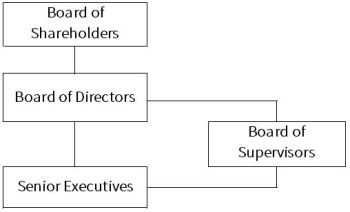At Horizons, we often encounter many senior executives, who overlook the role. Though the legal representative of a company in China holds full liabilities. Senior executives of a company in China, who do not simultaneously hold the legal representative role, can face civil or criminal liabilities. Furthermore, Senior foreign executives are subject to the same liabilities as their local counterparts. Underestimating the role and responsibilities of senior executives can raise risks for both the individual and the company. This article highlights the main takeaways for senior executives based in China.
Accountability of the senior executive
A three-tiered corporate governance for limited liability companies including foreign companies ('companies') in China is outlined under The Company Law of the People's Republic of China ("Company Law") - as demonstrated in figure 1. For senior executives, they are accountable to the board of directors or executive director, where there is only one director. Equally, there is internal supervisory in which, the board of supervisor or sole supervisor supervises the board of directors and senior executives.

- The board of shareholders holds the highest authority and determine the major issues in the company.
- The shareholders appoint the board of directors ("BOD") to oversee the company's daily operations. The BOD is accountable to the board of shareholders.
- The senior executives are appointed by the BOD and manage the day-to-day operations of the company.
- Both the BOD and senior executive are regulated by an internal supervisory system, namely the board of supervisors or the supervisor ("BOS"). For more information on the supervisory system, please see the article 'The importance of supervisors in corporate governance; high trust and understanding'.
Though, the Company Law sets out the corporate governance for companies in China, We recommend the reporting-line is clearly stated in the articles of association ('AoA') of the company, so that the governing structure is established from the start and the company is governed, in adherence to the AoA.
Which roles are deemed as senior executives?
Under Article 216 of the Company Law, senior executives include the general manager, deputy general manager, chief financial officer, secretary of the board of directors (for listed companies) and other personnel designated by the company's articles of association.
Role of senior executives
Under article 49 of the Company Law, the roles and powers of senior executives are provisions in the below:
- Oversee the production and business operations of the company and organise the implementation of the resolutions of the board of directors;
- Organise the implementation of the company's annual operational plans and investment plans;
- Draw up plans on the establishment of the company's internal management departments;
- Draw up the company's basic management system;
- Formulate the company's specific rules and regulations;
- Propose the appointment or dismissal of the company's any deputy manager and financial principal;
- Decide on the appointment or dismissal of executive personnel other than those whose appointment or dismissal is to be decided by the board of directors; and
- Any other function or power conferred on the manager by the board of directors. Where the functions and powers of the manager are otherwise provided in the articles of association, the articles of association shall prevail.
In practice, any actions rendered by senior executives outside the authorised scope should be approved by the BOD. Otherwise, such senior executive undertaking responsibilities beyond the scope could be deemed as an abuse of power. We recommend senior executives in China to thoroughly understand and review their responsibilities and powers, specifically any further functions or powers provisioned in the articles of association. For foreign investors residing outside of China, understanding the corporate governance structure is essential to govern senior executives and hold senior executives liable for any abuse, negligence or violation of their responsibilities.
Liabilities of senior executives
Similar to the BOD, senior executives are forbidden from the following actions under Article 148 of the Company Law:
- Misappropriate company funds;
- Divert company funds into an account held in his name or the name of any other individual;
- Loan company funds or provide any guaranty to any other person by using company property in violation of the articles of association without first obtaining the consent of the board of shareholders, the general meeting or the board of directors;
- Become a party to any contract or business dealings with the company in violation of the articles of association without first obtaining the consent of the board of shareholders or the general meeting;
- Seek business opportunities for himself or any other person by taking advantage of his position, or operate on his behalf or on behalf of any other person any business similar in nature to that of the company, without first obtaining the consent of the board of shareholders or the general meeting;
- Personally accept any commission on any transaction to which the company is a party; unlawfully disclose confidential company information; or
- Act in any way that is inconsistent with his duty of fidelity to the company. Any income received by any director or senior officer in violation of this article shall be treated as the property of the company.
Under the Company Law, senior executives are also obliged to act with fiduciary duties which refers to performing duties in the interest of the company. Specifically, senior executives shall perform duties with loyalty and due diligence according to corporate interests and complying with the relevant law, rules, and regulations. Neglecting responsibilities, mismanagement and abuse of position may lead to severe repercussions for the individual, both in civil and criminal proceedings.
Practical example
The chief financial officer ("CFO") personally profits from the sale of company assets without the resolution of the BOD. Such action can be deemed as misappropriating company assets for personal use and neglecting the duty of loyalty to the company. In such instance, the BOD can resolve to dismiss the CFO in accordance with the law. However, a dismissal before the expiration term of the labour contract could be held liable for breach of contract.
Alternatively, the BOS, as the internal supervisory system could initiate an internal investigation by reviewing the accounting books and so forth. Where the BOS finds the CFO has neglected the company's interests, the Company Law permits the BOS to initiate litigation on behalf of the company. Where the violation is deemed as criminal, criminal proceedings can be pursued.
Senior executives are important roles in a company and should be selected carefully. Although the scope of authority can be defined and governed within the AoA, selecting the wrong personnel for senior executive roles and directors and supervisors can cause major damage for the company in China. For senior executives in foreign companies, understanding the parameters and liabilities is essential to mitigate any unintended violations.
Originally published 26 May 2021
The content of this article is intended to provide a general guide to the subject matter. Specialist advice should be sought about your specific circumstances.


